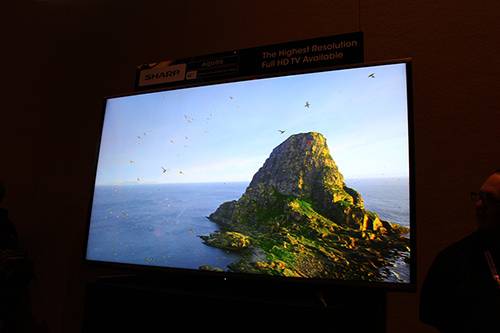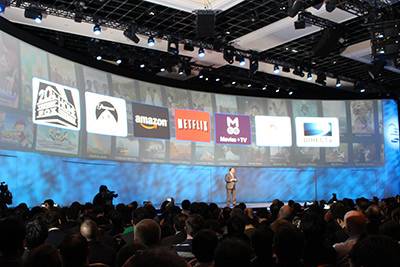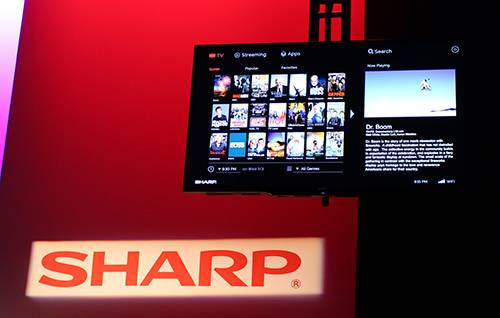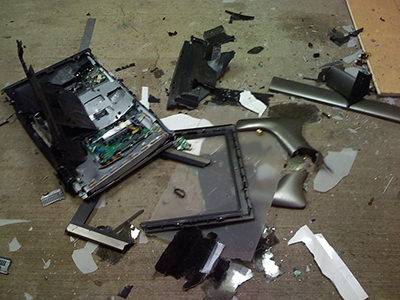
Televisions are not smartphones, no matter what TV makers would have you believe. But if there’s any confusion about that, it’s understandable. Both have increasingly large screens and are highly effective time-wasters. And given the proliferation of Internet-connected smart TVs, both phones and sets are platforms for an ever-growing range of features and apps.
But that last similarity is problematic. Unlike iPhones or Android devices, televisions are typically big-ticket items that people tend to hang onto for many years. That makes them much dicier purchases for consumers who want to make sure that their “smart” sets don’t turn into smart doorstops festooned with useless, abandoned apps and no hope of future support.
The Idiot Box Has Graduated

We’ve come a long way from the days when “idiot boxes” and “boob tubes” ruled the living room. Whether it’s the growing consumer interest in streaming entertainment or just a desire to whittle down the pile of black set-top boxes cluttering up homes, smart TVs have finally found some momentum after a few fitful years of experimentation.
According to NPD Group, more connected TVs are being made, bought and brought online than ever. The research firm expects consumers to install 23 million smart sets by 2015.
The possibilities and potential are exciting, not least to television manufacturers who’ve long been trapped in a dismal, low-margin business. In fact, it’s creating something of a scramble among smart TV makers, many of whom seem to think they’re duking it out to be crowned the Android or iOS of the smart-TV world.
The result: A frenzied flowering of TV-based app platforms, few of which are compatible with one another. Which means low odds that any of them are going to attract sustained developer interest unless and until there’s some consolidation behind a few winners, a situation that doesn’t look likely to come about soon.
Who’s The Smartest Of Them All?
In the race to smarten up televisions, more than a few noteworthy smart-TV operating-system hopefuls are stepping up to the starting line.

Roku, a popular name in standalone streaming set-top boxes, announced partnerships with Chinese TV manufacturers TCL and Hisense International to create televisions with Roku software and apps built right in.
Mozilla already took Firefox from desktop browser to smartphone operating system, and now it wants to slap its free software into televisions. The nonprofit will kick things off with Panasonic sets later this year, and if that works out, you can bet others will snag Firefox for other smart TV products (if for no other reason than that it’s free).
Opera is another Web browser courting TV makers. In fact, its software already graces TV screens from the likes of Sony, Samsung and Toshiba.
LG scooped up WebOS—the admired but ultimately failed smartphone platform—and retooled it for televisions. The old Palm Pre and Pixi would hardly recognize the new software now, with its chorus line of app “cards” organized by recent use or relevance. The formerly HP-owned OS will land on more than two-thirds of LG smart TVs this year.
Other manufacturers such as Vizio and Sharp have their own proprietary software.

Some of these TV makers aren’t restricted to a single approach either. LG’s Google TV sets are still available in the retail market, even got a long-awaited software update last fall, while Phillips has been dallying with Android. Apple, meanwhile, has stayed mum on the integrated smart TV front, but the rumors that it’s developing its own smart television refuse to die.
It’s a confusing mess that only gets more baffling when you realize how similar the actual experience of using a smart TV is, no matter what software is involved. You navigate guide data, conduct searches and stream online video from Netflix, Hulu and YouTube, among others. In some cases, you can share your activity on social networks or save a program to watch later. Overall, the features just don’t change that much from one TV to the next.
The way the features and apps are built, however, can vary widely. And that can present a problem for the people who make those TVs so smart: the app developers.
Well, Frag That

For outside developers, different devices and software requirements can pose a major problem. Instead of creating one universal app that can work in various products, they have to customize their apps for each different hardware/OS combination. Those adjustments can range from tweaking code to rebuilding apps from scratch for every platform and screen size.
The scenario is called “fragmentation,” and it’s a particularly vexing problem for the people who create apps. The mobile industry has been dealing with it for years, but the problem may be even worse for smart TV app makers. App Developer magazine points out that smart TV fragmentation is particularly challenging because, unlike the mobile industry, there are no dominant platforms in this area of technology.
Nigel Walley, managing director of media research firm Decipher, echoed that sentiment to MediaTel’s Newsline in Britain recently. Though the country’s ITV and Channel 4 are important smart TV app makers, he said, they and others are having difficulty staying on top of the challenging development environment because the industry still lacks a “credible” leader.
“LG had a few apps, but this year it’s an entirely new operating system, so they’ve had to build them all over again,” said Walley. “It’s causing mayhem.”
His solution: Don’t just take inspiration from mobile. Follow its lead. “It’s a completely fragmented market and no one now believes the future of smart TVs lies with proprietary operating systems,” he said.” It’s going to be Android, Windows or iOS.”
Fortunately, some of the major players in the smart TV industry have been getting behind HTML 5, a standard that essentially allows developers to build what amounts to adapted Web apps for television. HTML 5, which got a boost from mobile development, makes this process much simpler.
Not all smart TV makers are willing to forego proprietary approaches, and even if they did, it may not address other matters that can arise with multiple varying platforms—such as diverse requirements for app acceptance (presumably into some sort of store), publication or software updates. Still, the standard represents the best shot TV makers have to streamline what could quickly become a frustratingly complicated scenario for both consumers and developers. This is why groups like theSmart TV Alliancebelieve HTML 5 should be universally adopted, much the same way mobile devices tend to hew to the standard.
In other words, smart TVs are not like smartphones. But maybe, just maybe, they need to be.
Indiana Jones and The Last Crusade image screen capped from YouTube video by maxulic. Broken TV image via Flickr user velkr0
Updated: A section pertaining to HTML 5 was inadvertently left out, so the article was updated to include the missing section.










